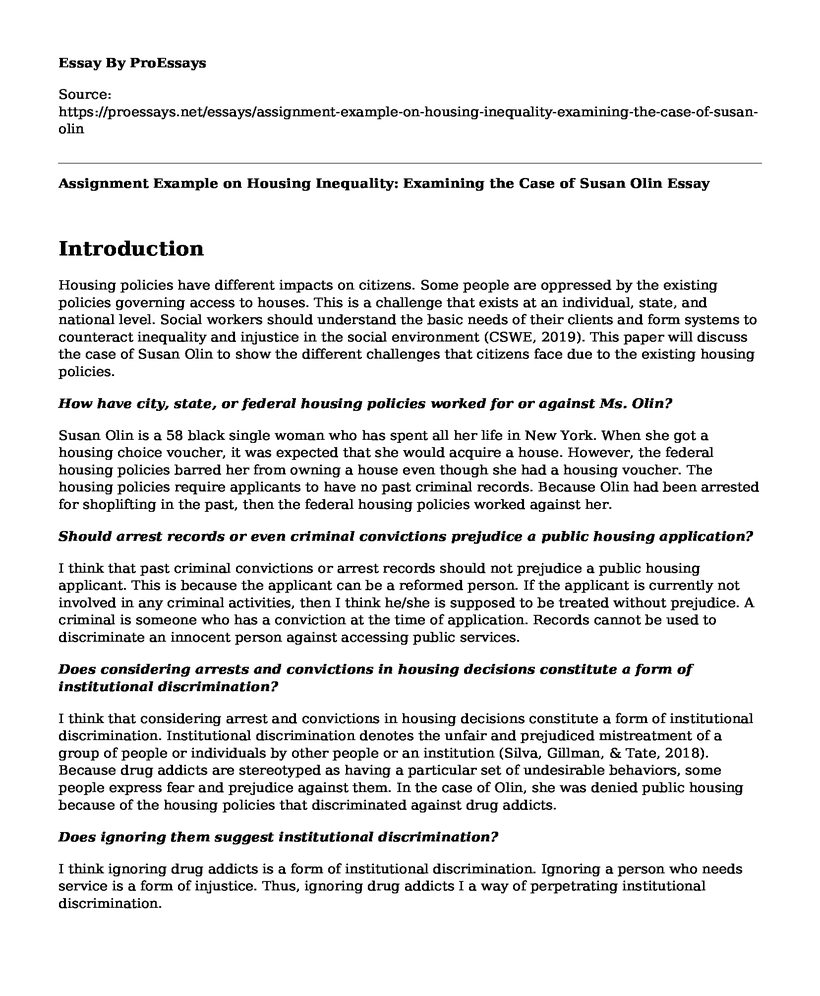Introduction
Housing policies have different impacts on citizens. Some people are oppressed by the existing policies governing access to houses. This is a challenge that exists at an individual, state, and national level. Social workers should understand the basic needs of their clients and form systems to counteract inequality and injustice in the social environment (CSWE, 2019). This paper will discuss the case of Susan Olin to show the different challenges that citizens face due to the existing housing policies.
How have city, state, or federal housing policies worked for or against Ms. Olin?
Susan Olin is a 58 black single woman who has spent all her life in New York. When she got a housing choice voucher, it was expected that she would acquire a house. However, the federal housing policies barred her from owning a house even though she had a housing voucher. The housing policies require applicants to have no past criminal records. Because Olin had been arrested for shoplifting in the past, then the federal housing policies worked against her.
Should arrest records or even criminal convictions prejudice a public housing application?
I think that past criminal convictions or arrest records should not prejudice a public housing applicant. This is because the applicant can be a reformed person. If the applicant is currently not involved in any criminal activities, then I think he/she is supposed to be treated without prejudice. A criminal is someone who has a conviction at the time of application. Records cannot be used to discriminate an innocent person against accessing public services.
Does considering arrests and convictions in housing decisions constitute a form of institutional discrimination?
I think that considering arrest and convictions in housing decisions constitute a form of institutional discrimination. Institutional discrimination denotes the unfair and prejudiced mistreatment of a group of people or individuals by other people or an institution (Silva, Gillman, & Tate, 2018). Because drug addicts are stereotyped as having a particular set of undesirable behaviors, some people express fear and prejudice against them. In the case of Olin, she was denied public housing because of the housing policies that discriminated against drug addicts.
Does ignoring them suggest institutional discrimination?
I think ignoring drug addicts is a form of institutional discrimination. Ignoring a person who needs service is a form of injustice. Thus, ignoring drug addicts I a way of perpetrating institutional discrimination.
Are all arrests and convictions the same?
I think all arrest and convictions fall under different categories in the US. For example, the criminal justice system has three categories of crimes: felonies, misdemeanors, and infractions. Arrest resulting from felonies are subject to huge fines (Roberts, 2018). On the other hand, arrests and convictions from misdemeanors and infractions are regarded as fewer degree crimes. Therefore, arrests and convictions are not the same in the US.
Should one look at the nature of the crime, when it occurred, etc.?
I think that social workers should not look at the time when the crime occurred, especially when accepting public house applications. This is because a person may have committed a crime in the past but later reformed to be a law-abiding citizen. I think such a person should not be denied access to social services because he/she is a law-abiding citizen at the time of application.
What changes in housing policy might help Ms. Olin? Do you believe these changes would affect her substance abuse and potential for sustaining her recovery? Why or why not?
I think housing policies should be altered to accommodate all US citizens regardless of their past criminal record. The policy should be changed to allow the applicant to get social services if he/she has no criminal record at the time of application. Such a change can help Olin get a house. I believe such a move would help Olin to stop her behaviors of substance use because currently, she is living with a friend who is a drug addict. It is very likely that the friend can influence her to go back to drugs. However, if Olin has her own house, she can recover from drug abuse since the influence will be minimal.
References
Council on social work education (2019) Social policy analysis, advocacy, and practice: substance abuse, Susan Olin story. Retrieved from: https://www.cswe.org/Roberts, J. (2018). Public opinion, crime, and criminal justice. Routledge
Silva, E. O., Gillman, C. J., & Tate, K. L. (2018). Confronting Institutional Discrimination in a Color-Blind World. Qualitative Sociology Review, 14, 84-108.
Cite this page
Assignment Example on Housing Inequality: Examining the Case of Susan Olin. (2023, Jan 14). Retrieved from https://proessays.net/essays/assignment-example-on-housing-inequality-examining-the-case-of-susan-olin
If you are the original author of this essay and no longer wish to have it published on the ProEssays website, please click below to request its removal:
- Multicultural Education - Paper Sample
- Argumentative Essay on Social Media Policies in Colleges
- Policies to Reduce Banking and Financial Crises Essay
- Difference Between Government and Society - Essay Sample
- Privacy: A Right or a Privilege in the Digital Age? - Essay Sample
- Economic Disparities Between Colombia and Brazil - Essay Sample
- Essay on Organized Government: Essential Instrumentalities for a Welfare State







